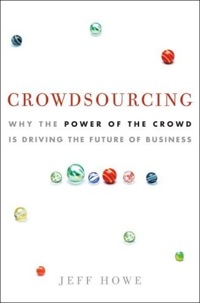 [Here’s the third and final response in this month’s Lab Book Club. We’re reading Crowdsourcing by Wired writer Jeff Howe; Chris Vognar from The Dallas Morning News responds below to chapters 8 through 11. See here for more about the Lab Book Club. —Ed.]
[Here’s the third and final response in this month’s Lab Book Club. We’re reading Crowdsourcing by Wired writer Jeff Howe; Chris Vognar from The Dallas Morning News responds below to chapters 8 through 11. See here for more about the Lab Book Club. —Ed.]
We’ve saved the devil’s advocate portion of our Crowdsourcing analysis for last (because, as W.E.B. Do Bois once said, the devil must take the hindmost). This isn’t to say I think crowdsourcing is a sham; on the contrary, for better and/or worse, the crowd is here to stay.
I’m just now sure how warmly or universally we should welcome that reality.
Jeff Howe’s conclusion reinforces my belief that crowdsourcing is more benign and useful for some tasks than others. For example, kudos to the anonymous basement dweller Minh Lee, who crafted the perfect game mod for Half-Life. Such activities seem perfectly suited for a basement. What better place to kill off extra-dimensional monsters and zombies?
Some trades, however, might just demand a little professional training, or even an official imprimatur. Which brings us to journalism. There’s something reassuring about the assumption that reporters have learned to ask follow-up questions, or dig for documents, or work a beat, or cultivate sources, or work with an editor (God forbid!). To be fair, Howe isn’t suggesting that anyone should have any platform to tell any story; his Rules of Crowdsourcing contain many a caveat, including Pick the Right Crowd and the Benevolent Dictator Principle, that serve as gestures of quality control. He doesn’t want the crowd to run amok.
But I’m still not sold. Most blogs, including mine, are collections of observations and opinions that use previously reported work from old fogy professionals. When I was a kid (huff, puff) there was a general belief that one should study film and literature, and learn the difference between opinion and analysis, before becoming a movie critic. Anyone who thinks the same standards still apply hasn’t surfed the Web in a while.
The fact, as Howe acknowledges, is that crowds contain a wide range of intelligence and lack thereof. That’s why I get nervous when folks make sweeping pronouncements about democratizing the media. It is doubtless true that one doesn’t need a journalism degree to become a journalist. I don’t have one. But it’s equally true that some people know a lot more about some subjects — government, music, sports, geopolitics — than others. They have paid the dues and passed the tests, are best prepared to make sense of the world. Yes, I still take comfort in the idea of expertise.
And this is what really gives me pause. In the past eight years such quaint staples as facts, research, and experts have been thrown under the bus by a political culture that deems them unnecessary. Global warming? Oh, you and your wacky science. Exit strategy? Please. So what if you’ve spent most of your life gathering information and boiling it down to conclusions? Experts are just so passé.
It would be hard to argue that this approach has worked. But distrust of experts, or informed analysis, has trickled down through the entire culture. To me, crowdsourcing suggests that the novice is by definition just as qualified as the professional. That degrees and certificates are just so many pieces of paper. That “elite” is a dirty word. Call me old fashioned, but I take comfort when the guy behind the wheel has a driver’s license.
So sayeth the devil — who, as you might also recall, is in the details.
Chris Vognar is a Nieman Fellow at Harvard and an arts critic for The Dallas Morning News.